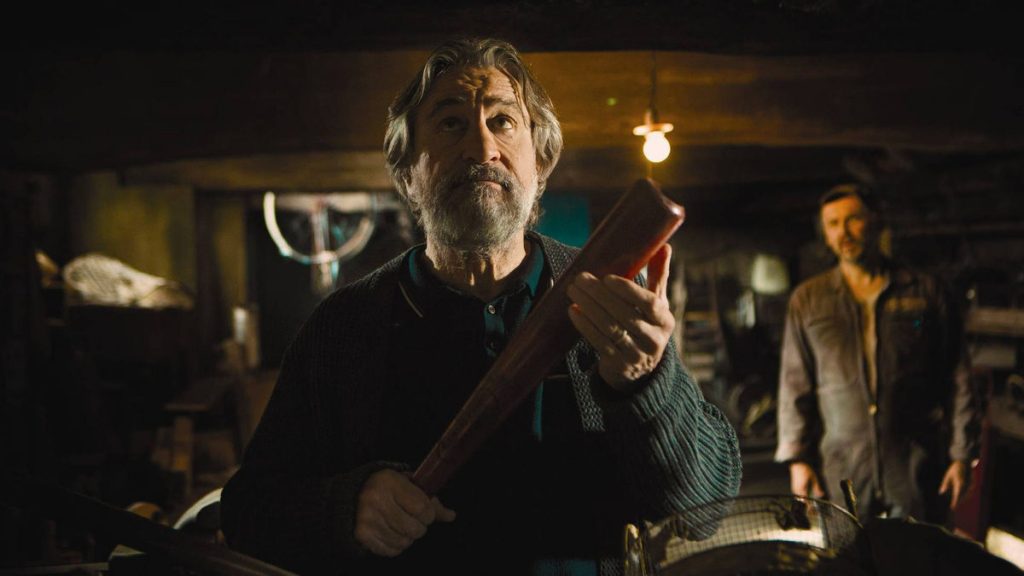The Family (2013)

Robert De Niro (Silver Linings Playbook, Limitless) stars as Fred Blake (formerly a mob boss named Giovanni Manzoni), who, along with his wife Maggie (Pfeiffer, Dark Shadows) and two teenage children, Belle (Agron, I Am Number Four) and Warren (D’Leo, Cop Out), is sent from their home in Brooklyn to (ultimately, after several relocations) a small, quaint town in Normandy, France via the witness protection program for snitching on his Mafia family. However, he’s hotly wanted dead by those he ratted on, who still control their criminal empire from behind the iron bars of prison.
Tommy Lee Jones (Lincoln, Men In Black 3) plays the long-suffering government agent who keeps tabs on the Manzonis, growing weary of the frequent ways they find to blow their cover and alert their would-be killers of their current home — something Fred seems hell-bent on doing now that he has the bug to write a memoir. Old ways die hard, as even in this tiny town, this family solves problems the only way they know how, which is to resort to deadly violence against anyone who messes with them.
The Family is a dark comedy directed by Luc Besson, a French director who has achieved international success mainly due to his knack for Hollywood-style action flicks like La Femme Nikita, The Professional, and The Fifth Element. Unfortunately, most of those films are long in the past, and in the interim, Besson has spent most of his time as a screenwriter, and not a particularly good one, for such lackluster films as Kiss of the Dragon, The Transporter and its first sequel, as well as Taken and its sequel.
The fundamental problem with The Family is that Besson bases the entire foundation of the humor on the audience thinking it hilarious to see wildly stereotypical gangsters living among peaceful French townies (who all happen to speak English quite well), especially in how much violence explodes out of them for relatively mild transgressions on the part of the French locals, such as snobbery and deviousness. Scenes abound in which someone will mildly step on a toe of a Blake only for them to exact retribution ten times beyond what the situation calls for.
In one scene, Maggie goes to the market to pick up some items, including peanut butter, only to be told, with a certain disdain, they don’t stock such things. When the clerk continues to rant about Americans to his French companions, Maggie decides to blow the place up. In another, the local plumber is called in by Fred to put an end to the brown water coming out of the pipes. When Fred suspects that the plumber is trying to gouge him, he takes to beating him with a baseball bat to the point the dense wooden weapon breaks, and continues working on destroying the guy beyond recognition with a hammer. And a few of the scenes of violence are merely imagined by Fred in daydreams, aka Besson’s “just kidding” moments that also fail to generate laughs.
Such things may have seemed funny to imagine in the mind of Besson, adapting the book by French author Tonino Benacquista, “Malavita” (aka, “Badfellas”), who must have seen GoodFellas (which gets a surprise homage in this Martin Scorsese co-produced film, in perhaps the best scene) and thought it might be funny to see how mafia types might have a difficult time adjusting to small town life when they’re relocated due to witness protection. It sure doesn’t play particularly funny when you see it on the screen. Never mind that this premise has been done before, in the more successful 1990 Steve Martin/Rick Moranis comedy, My Blue Heaven.
Keeping The Family from the movie abyss is the fine cast of actors, though they’re not doing anything they haven’t done before. De Niro could play a mob boss in his sleep (and practically does here), while Pfeiffer mostly reprises her accent from Married to the Mob. Tommy Lee Jones supports with yet another Federal Agent character in a long series of many. The time spent with the Blake children is mostly superfluous, particularly the lengthy and completely pointless side story of Belle, who seems like the Marilyn Munster of the Manzoni family, trying to woo the dreamy-eyed math nerd in school.
While never great, The Family maintains a certain watchability for about two-thirds of the film before finally coming unhinged in the climax, whereby the real threat comes to Normandy in the form of the Mafia hitmen sent to ‘snuff out the rats’. After this point, the blackly comic tone turns mostly serious, and Besson’s style doesn’t have the build-up to support taking these dire situations as gripping or emotionally resonant, especially as this family is far too despicable to be worth rooting for. The only people you end up feeling sorry for are the innocent people who are killed by the mobsters along the way; Besson paints these beats with tongue-in-cheek, but eventually, they lose their comedic flavor.
Despite its cast, Besson’s sense of style, and some eye-catching cinematography from Theirry Arbogast (Bandidas, Catwoman), The Family is just a collection of sporadically amusing and/or vaguely interesting scenes stuffed into an overall misguided idea for a subversive comedy. Unless you’re a huge fan of the cast or Besson, there’s not much here to keep The Family from escaping its inherently dysfunctional tendencies.
Qwipster’s rating: D+
MPAA Rated: R for violence, language and brief sexuality
Running Time: 110 min.
Cast: Robert De Niro, Michelle Pfeiffer, Dianna Agron, John D’Leo, Tommy Lee Jones, Jon Freda, Jimmy Palumbo, Domenick Lombardozzi, Stan Carp, Vincent Pastore
Director: Luc Besson
Screenplay: Luc Besson, Michael Caleo (based on the book, “Malavita” by Tonino Benacquista)
